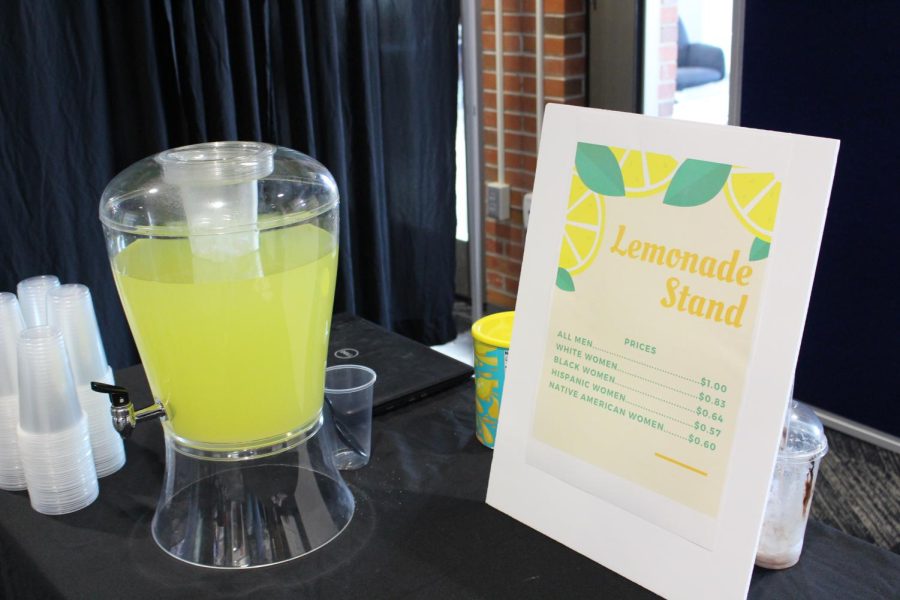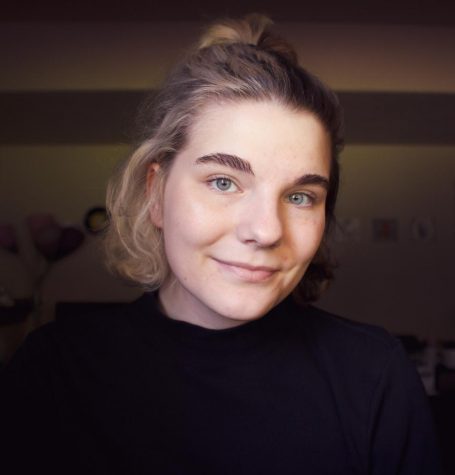Tunnel of Oppression addresses privilege, mental health
April 5, 2022
The Tunnel of Oppression is an event hosted by the Multicultural Center each year. The event took place Tuesday in the Student Union Hobo Day Gallery from 11 a.m. to 1 p.m. It was designed by student leaders, faculty and staff to educate the general population about major issues that are happening in their communities and what can be done to help solve the issue.
This year, the Tunnel of Oppression was collaborated on by the Gender & Sexuality Alliance (GSA), Feminist Equality Movement (FEM), American Indian Science and Engineering Society (AISES), Black Student Alliance (BSA), Facilities & Services Office of Sustainability and the Latin American Student Association (LASA), according to Irakoze Naftari, the retention adviser for African American Programs.
Each collaborator set up interactive activities. The most popular being the FEM club’s wage gap lemonade stand and BSA’s video presentation on privilege.
“The topic we chose was privilege, so our video is focused on micro and macro aggressions,” Adonai Ghebrekidan, BSA president, said. “We had four people talk in the video, one being me. Naomi Wynn, former president of the club, Narlon Wiley and Teneea Rhodes, former executive of the club, also spoke. We also talked about discrimination based on appearance or ethnicity and everything that revolves around it.”
BSA finished off their presentation with an activity including a soccer ball with questions about privilege on it, one being “What is a time that you have been in the minority? How did it feel?”
“One dude came in and he talked about race and how he’s never actually had to talk about race when he was growing up,” Ghebrekidan said. “He had to learn it all when he was in college. As people of the minority, we really have to talk about it right out the womb, so that we know when we’re discriminated against.”
GSA selected the topic of mental health within the LGBTQ+ Community, focusing on anxiety and depression because it has been discussed within their past meetings.
Free pride pins were spread out in front of a poster board which outlined different situations people may be faced with regarding LGBTQ+ people. The topic got people to describe how they experience the world to a supportive and engaged audience.
“Multiple articles have been published recently, presumably due to the rise in anti-transgender bills within South Dakota, regarding the incredibly high rates of depression and anxiety of LGBTQ+ individuals within the state, estimated at 90%,” Bailey Biegley, president of GSA, said.
Another booth focused on how climate change affects all people differently. Participants blindly picked a card which outlined a hypothetical living situation, health condition, career and insurance. Participants were then given scenarios, such as a heat wave, and asked how they would handle or be affected by the scenario.
“We’ll all be affected by climate change, but it’s not going to impact us all equally depending on resources, jobs and situations,” sustainability specialist Jennifer McLaughlin said. “Communities are affected differently, including communities of color, because of redlining.”
In previous years, the Tunnel of Oppression was done virtually.
“Even during COVID, we did a virtual version on one topic versus having multiple presenters. And then last year, we did a hybrid setting. We had a virtual speaker, and then we had presentations instead of an interactive-type environment,” Alex Wood, assistant director of multicultural affairs, said.
Some of the past topics have been the issues at the Southern border with the separation of families, former LASA President Lorena Diaz-Martinez said.
In addition, Nathaniel Condelli, residence hall director, helped the Housing and Residential Life when they participated in the event last year. They presented staged phone recordings which focused on identity and the student experience, Condelli said. They didn’t focus on a specific topic, as they wanted to connect it to identity.
“The exhibits typically center around minority populations and specific examples of how people within those groups have been oppressed throughout history including current examples,” Condelli said.
Condelli added that “the Tunnel of Oppression is extremely impactful and at times uncomfortable to participate in. These interactive exhibits only give us a glimpse into what people have faced and continue to face. When we can embrace the idea that learning is uncomfortable, we learn to be more empathetic and positively engaged community members.”





















